Recruits can skip entrance exam with an ATAR of 65 or above and English study score of at least 25
Victoria Police in overhauling its education and health requirements for recruits in a bid to tackle a shortage of frontline officers. This is what’s changing.
Police & Courts
Don't miss out on the headlines from Police & Courts. Followed categories will be added to My News.
Victoria Police is loosening its academic standards in a bid to lift its abysmal recruitment figures.
The force has relaxed several education and health requirements that previously would have stopped some recruits from being eligible to join.
Applicants who achieve an Australian Tertiary Admission Ranking (ATAR) of 65 or above, as well as a study score of at least 25 in English, will no longer be required to sit the force’s entrance exam.
The average ATAR in Victoria last year was 69.52.
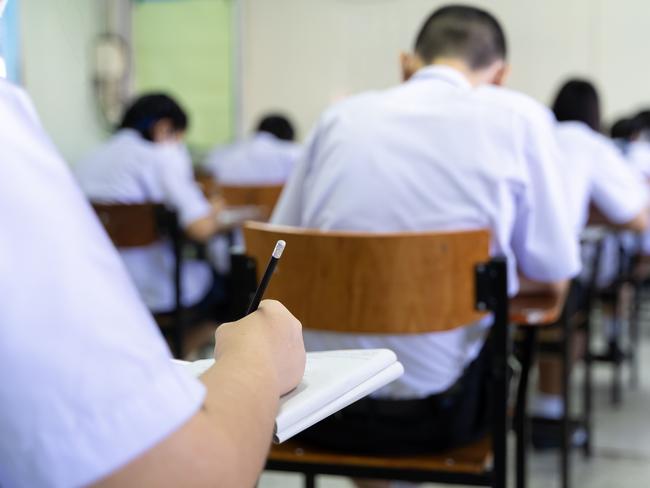
In a statewide email to members seen by the Herald Sun, Acting Chief Commissioner Rick Nugent said the change meant that paramedics, firefighters and defence personnel wanting to join the force could also bypass the assessment.
“These changes will remove the first barrier for eligible applicants and will fast-track the recruitment process,” Mr Nugent said.
There is no minimum ATAR, study score or education level required to join Victoria Police.
Recruits without an ATAR of 65 or English score of 25 will still need to sit the entrance exam.
After the Herald Sun revealed recruitment requirements were being relaxed, a statement released by Victoria Police said the changes brought requirements into line with those for applying to become a PSO.
The changes will take effect immediately and apply to applicants who graduated VCE with those results or worked in emergency services in Australia, New Zealand or the United Kingdom within the last five years.
In further changes announced on Tuesday, some Victorian Public Service (VPS) employees will also be eligible to skip the entrance exam.
They include Victoria Police employees and VPS workers who worked at a Grade three or higher - which can include management, support or supervisory roles.
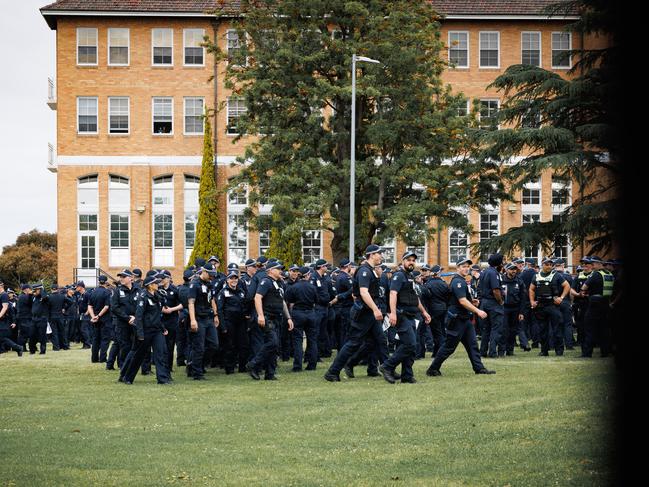
Those who have successfully passed entry requirements for interstate police forces and university graduates with degrees in the arts, science, humanities, business and law, as well as current students in their final year of studying criminology, will also be added to the list of applicants eligible to skip the exam.
Applicants who are required to sit the exam must still pass all of its literacy, writing, verbal skills and numeracy components.
The Victoria Police Academy in Glen Waverley will double its squad intakes, up from 22 recruits to 44 recruits each to streamline the final stages of the recruitment process.
Acting Chief Commissioner Rick Nugent said on Tuesday that the changes meant applicants would no longer be held up by “unnecessary obstacles”.
“There’s no doubt policing can be a tough job and it takes a special person to do it,” he said.
“We want to make sure we’re doing everything we can to attract those people and back the hardworking police making a difference out in the community each and every day.”
It comes after Mr Nugent indicated earlier this month that several changes to entrance requirements would be brought in to boost the number of new recruits to help combat low morale and burnout.
“Morale is not what it should be and our people are overstretched in many areas,” Mr Nugent said.
Also among the changes waved through this week was the removal of most applicants having to undergo a one-on-one appointment with a psychologist.
“We have reviewed our psychological testing and I am confident it is more than robust to identify issues without everyone needing to go through one-on-one testing,” Mr Nugent said.
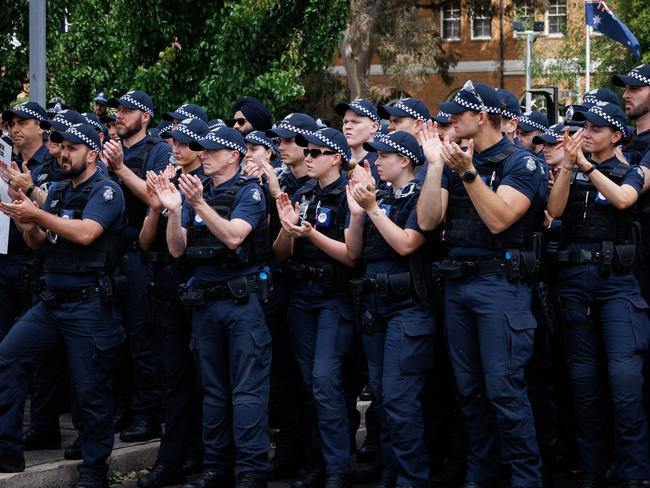
“Of course, the option is still available if and when we need it, but the reality is we have been overusing this service and it is adding an unnecessary layer to the recruitment process.”
The force will now accept GP sign-offs on some medical conditions and injuries “where possible” to speed up recruitment.
Some members have raised concerns about whether the revised entrance requirements would see some members struggle in the job if recruited.
The Herald Sun revealed last month that more than 150 police had left the force in the past year.
Despite 1000 recruits graduating from the academy in that time, there were more than 1000 vacancies within the force, with many of those roles vacant because members were on sick leave or WorkCover.
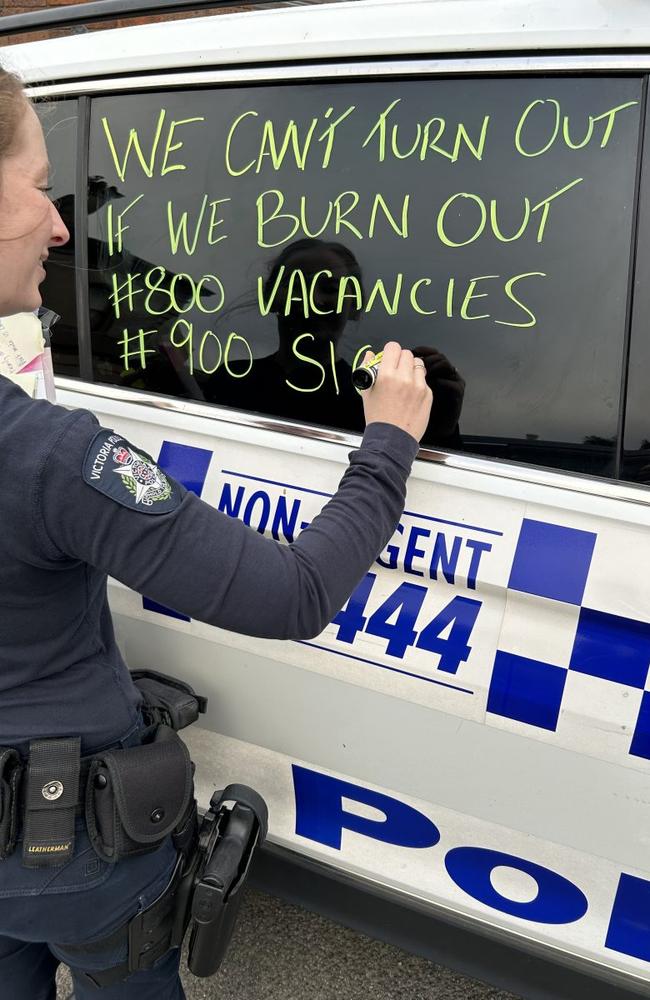
There were 640 members off on WorkCover in August last year, most with mental injury, Victoria Police figures showed.
Members have flagged burnout and a lack of staff as major drivers of retention issues.
A bitter pay dispute between the force and the state government dragged on for the better part of two years as officers became more vocal about serious offenders being bailed repeatedly and being unable to attend every call-out.
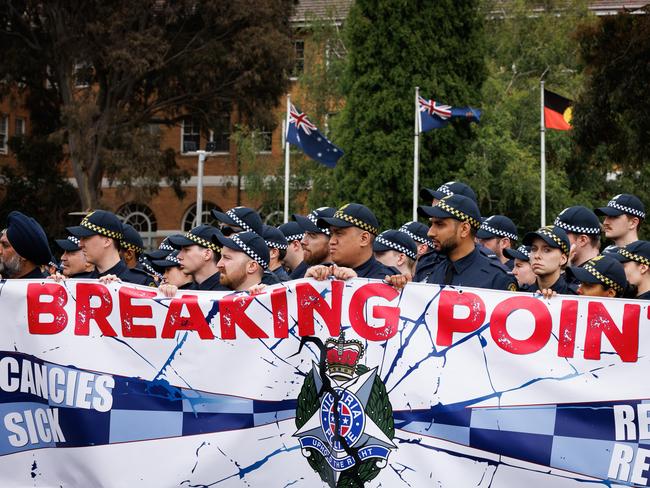
A coronial investigation into police suicides found that two members took their own lives each year as workplace bullying, excessive workload and rostering were shown to be major factors that contributed to the wider issue of suicide within the force.
“I said last week that recruitment would be an ongoing priority for me, but if we are to tackle the current shortage of members in stations then we need an equal focus on how we also slow the rate of those exiting our organisation,” Mr Nugent said in the email.
“It’s a problem that needs addressing from all sides if we are to release some of the pressure currently being felt by our frontline police officers, and more broadly by our specialist areas, our PSOs, PCOs and our VPS.
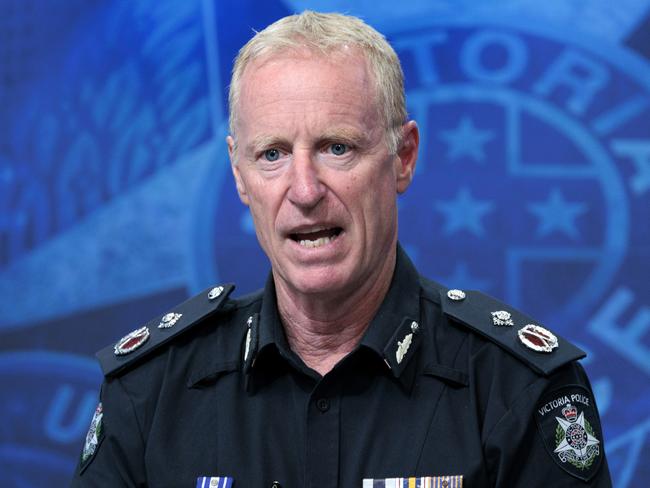
“The simple fact is too many people are leaving our organisation injured, fatigued, or dissatisfied.
“I want all our employees to feel supported and empowered to do their jobs, enjoying their work and taking pride in the organisation.”
Shadow Police Minister David Southwick backed the move to relax entry requirements.
“Any measure that removes unnecessary barriers to a career in policing is a step in the right direction,” he said.
“With Victoria in the midst of a crime crisis, why has it taken the Allan Labor Government so long to act?
“The best way to attract and retain the police officers our state needs is to back the frontline with stronger bail laws, better resourcing and greater powers to keep the community safe.
“There is now no excuse left for Labor to allow the 1,000 frontline officer vacancies to remain ongoing and the 43 stations across Victoria to remain closed.”



